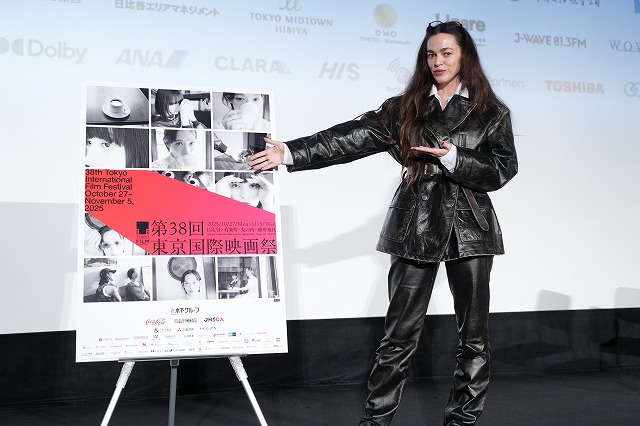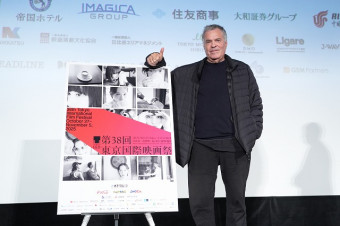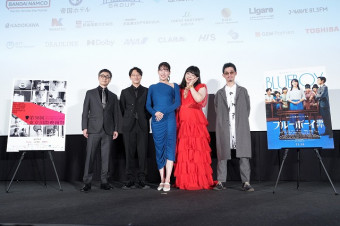
Writer-director Hailey Gates took the stage on November 1 for a Q&A session following the Asian premiere of her feature debut, Atropia, in the Competition section of the 38th Tokyo International Film Festival, and told the audience, “It was such a pleasure to watch this film with you. I’m really happy that the comedy was translating. Thank you so much to TIFF for believing in this movie and playing it. We’re very far from home, so it’s really exciting to be here with you all.”
TIFF Programming Director Ichiyama Shozo moderated the session, and began by commenting, “When I first heard about this film, I was wondering what ‘Atropia’ was. So I Googled it and was surprised to find out that it is a real facility, a training camp. I was not aware of this at all. I think many people didn’t know the camps exist. Can you tell us why you chose this subject?”
Gates confirmed, “Many Americans don’t know that they exist. I became fascinated by these fake villages that were built on military bases in the US after 9/11 to train soldiers before they deployed to Iraq. I was actually trying to get a job working [as an actor] on a base and make a documentary about it. So I spent a lot of time visiting bases and speaking to the Department of Defense and trying to get permission to make a documentary there. But they just kept pushing back. So I decided it was such an absurd and strange play that the US military was putting on, it lent itself to comedy.”
Expanding on the subject she explored in her 2019 short film Shako Mako, Gates goes daringly gonzo, combining satire, romance, mustard gas, Afghan villager animatronics, protected wildlife and a cartoonish cameo by Channing Tatum, to create an enormously oddball but thought-provoking entertainment, produced by Luca Guadagnino of Call Me By Your Name fame.
In the film, the titular Atropia is a fictional town built like a movie set with Middle Eastern streetscapes and surrounded by California desert. There are Mexicans playing Iraqis, and an Iraqi-American actress, Fayruz (Alia Shawkat), who gives everything to her role of chemical weapons scientist, in the hopes of a Hollywood break. “I give you my best performances and no one will ever see them!” she laments. When she meets a seasoned soldier, Dice (Callum Turner), on the eve of his Iraq re-deployment, there’s an instant attraction, but like everything else in the village, their relationship isn’t built to last.
During the Q&A session, Gates was asked if there had been an inspiration for Fayruz. “There wasn’t one person,” she replied, “but there were a couple women I had interviewed, one of whom was Iraqi, and she was such a good actor that they started giving her more difficult roles, and she did play a mustard gas chemist. But there was nobody that was desperate to be a [Hollywood] actor. That’s something that we invented.”
Citing several films about war, an audience member asked how Gates had decided on the right approach to deliver her message.
Said Gates, “Growing up, there were not many American films about the Iraq War that were anti-war. There were a lot of films that were sort of jingoistic and were made in concert with the American military. I was just wanting to see a film about the Iraq War that I hadn’t seen before, and so I wanted to take a very different approach. I like to try to find Trojan horse storytelling techniques— using a different way of making a war film.”
“But for me, I think the film is really about the military-industrial complex and the forever wars, and how America doesn’t believe it’s itself unless it’s at war. There’s a Fayruz acting here today, but tomorrow there’ll be a Russian woman doing the same thing, and then the next year, another war. And so it’s more of a portrait of something that feels like unfortunately will never end.”
Another viewer mentioned that near the end, “a commander talks about how there’s never a soldier who’s ready to go to war. You’re never ready for the battlefield. What did you think about portraying these people who are in training, but actually they’ll never be ready to go to war?”
Gates’ response was unexpected: “Joining the military is America’s only kind-of-socialist project. And it’s funny because Americans are generally very fearful of socialism. But in America, if you want to go to a university for free or you want free healthcare or, you know, you want to live a nice life, joining the military is the only way, if you don’t have the means to do that, that you can.”
“I didn’t want to demonize the boys so much because I think a lot of people don’t have a choice in that sense. And I think they’re cannon fodder, they’re out to do the bidding of the men above them who are making all the decisions.”
Asked about the meaning she wanted to convey with the last scene, the director responded, “I don’t want to be very prescriptive about the ending, because you should take away whatever you want to take away from it. But for me, the feeling at the end is that they say they care about these boys. They say they care about the [endangered] tortoise. But all of these things in their mind are replaceable. And it will just continue on. And to be honest, the tortoise is almost saddest of all, because it will really go extinct.”
Noting that depictions of war on screen have changed over the years, moving from the rah-rah soldiers of Starship Troopers to the AWOL soldier in the Oscar-winning Cold Mountain, an attendee asked how Gates thought the film would be received in America.
“That’s a good question,” she said. “I think the young people like it, and I think older people have a little bit of a tougher time with it. But I’ve only played it once at Sundance. It hasn’t come out yet in America. We’ll see.”
Q&A Session: Competition
Atropia
Guests: Hailey Gates (Director/Screenplay)



























































